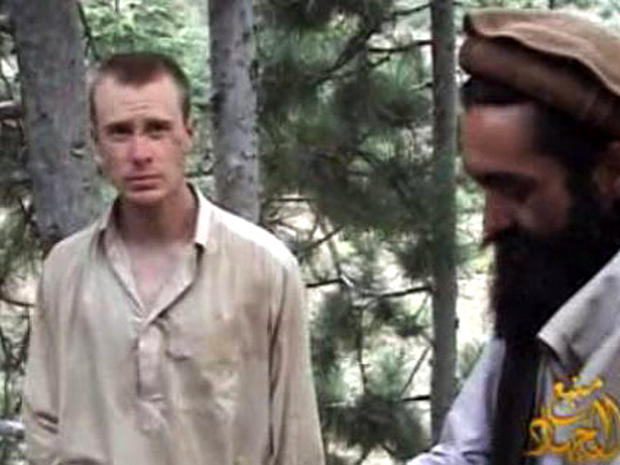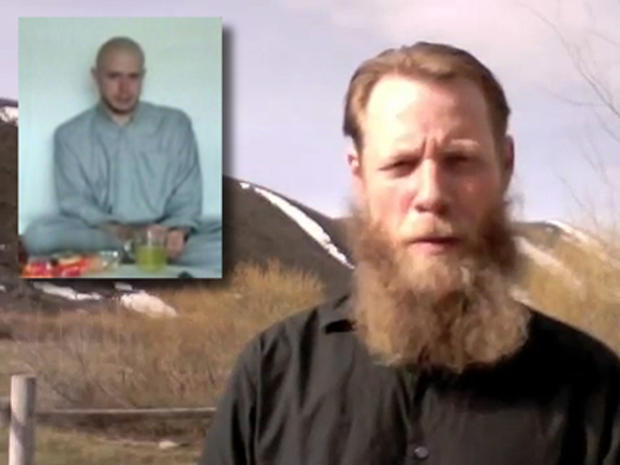Bowe Bergdahl: Prisoner of war, politics and diplomacy
This analysis was written by Jere Van Dyk, a CBS News terrorism analyst and contributor who has spent three decades studying and reporting on the Islamic militant groups of Afghanistan and Pakistan.
(CBS News) In June 2009, U.S. Army Sergeant Bowe Bergdahl was captured in Paktika Province, eastern Afghanistan, by men loyal to the Haqqani Network, a militant group based across the border in North Waziristan, Pakistan.
The Haqqani network is tied to, but not directly under the control of, Mullah Muhammad Omar, leader of the Afghan Taliban.
Bergdahl would have been taken away quickly on narrow paths through steep, rolling mountains and pine forests, through valleys, past small villages, and then down across the unmarked border into Pakistan.
The patriarch of the Haqqani Network is Jalaladin Haqqani, who was a U.S. ally in the 1980s, when America supplied his militants with billions of dollars in weaponry to fight the Soviet Union - then a common enemy which had invaded Afghanistan.
Bergdahl's parents, afraid of the Taliban, of the drone warfare in the tribal areas, and frustrated because they don't feel the U.S. is doing enough to try to free their son, have given their first interviews to newspapers, in a move aimed at putting pressure on the Obama administration.
Pentagon: Doing "everything in our power" to find Bergdahl
"Secret talks" for sole U.S. POW in Afghanistan
Captured soldier's dad seeks help via YouTube
They feel the White House is afraid to make a deal with the kidnappers in an election year, due to pressure from members of Congress and Mr. Obama's Republican rivals who oppose any negotiation with the Taliban.
Robert Bergdahl, Sgt. Bergdahl's father, has reached out to the Taliban via the Internet. "You do not leave something like this to government officials," he told The New York Times.
But his move comes with its own risks.
Negotiations, surveillance and politics
The U.S., non government agencies, and private individuals have quietly been trying to find Sgt. Bergdahl since he disappeared. His plight has been part of the negotiations between the U.S. and the Taliban - talks which apparently stalled in March.
I understand Bergdahl's plight and his family's fears. In 2008, I was kidnapped by the Taliban. I was hiking in Pakistan's tribal areas to meet a Taliban leader who said he would take me to meet Haqqani, with whom I had lived as a newspaper reporter in the 1980s.
But I was betrayed. I was blindfolded and taken deeper into the mountains, kept with my interpreter and two bodyguards in a small dark room with mud-baked walls. After two weeks a drone appeared overhead and stayed put for a month, 18 hours a day.
After I was released, I asked an F.B.I. agent involved in my case if that drone was there to watch for me or to watch the Taliban. "We brought all assets into play," he responded.
The U.S., and private organizations, using local spies and by monitoring all cell and satellite phone traffic in the area - and through the use of drones and other technology - probably know the approximate area where Bergdahl is being kept, even if he is being moved around.
The ISI, Pakistan's military intelligence agency, which, according to the U.S., has close ties to the Haqqani Network, probably knows exactly where he is being kept.
Admiral Mike Mullen, former Chairman of the Joint Chiefs of Staff, said before retiring in 2011 that the Haqqani Network is a "veritable arm of the ISI." Bergdahl is a pawn on a giant chessboard that extends from Washington to Islamabad.
The U.S. government says that it "does not negotiate with terrorists," yet there have long been reports that the U.S. has tried to talk with Haqqani, and that in its talks with the Taliban they have discussed, in a confidence-building measure, a possible prisoner swap from Guantanamo for Bergdahl. But this may be too difficult for President Obama to do in an election year.
Leader Taliban figure talks of internal divisions
Afghan peace negotiator shot dead
U.S. freeing terror detainees for promises of peace?
Robert Bergdahl has said that he has made contact, via the Internet, with the Taliban. This is delicate. The Taliban could play the Bergdahls against the government. They have shown five videos of Bergdahl thus far. They could release others to try and manipulate the Bergdahls, and U.S. public opinion.
One reason for President Obama's May 2 trip to Afghanistan, where he met with troops and signed a Strategic Agreement with President Karzai, was to talk with him about restarting negotiations with the Taliban.
Video: Obama says "new day" coming in Afghanistan
Bergdahl's family wants their son home. Everyone understands this and sympathizes with them. But contacting the Taliban directly and publicly putting pressure on the Obama administration to negotiate harder is delicate.
The U.S. wants guarantees that if the U.S. were to exchange five Afghan Taliban from Guantanamo for Bergdahl, that they would not return to the battlefield. It also wants them to cut their ties to al Qaeda. The Taliban have not agreed to either demand. President Obama, who wants, like most of the American public, to bring American troops home, feels the only way is to negotiate with the Taliban.
Mitt Romney has said that he wants to kill the Taliban, not negotiate with them.
Romney, White House spar over stance on Taliban
Robert Bergdahl, aware that Romney could win the White House in November, may feel that he has to act now if he hopes to get his son back soon. Who can blame him? Who would act differently?
What is life like for Bergdahl?
The people who live in the villages dotting the rugged North Waziristan terrain are almost entirely ethnic Pashtuns. Most still follow their ancient, strict tribal code, called Pashtunwali, which demands they protect to the death a guest in their homes.
Bergdahl, as strange as it sounds, is a guest as well as a prisoner of war. I do not believe, therefore, that they have harmed him, nor will they harm him.
The Haqqani Network, which is keen to show the world that they take better care of prisoners than the U.S. has done at its prison camps, will likely have fed him and kept him in good health. They will have tried to win him over to their side, by preaching to him about their version of Islam and by tempting him with offers of a wife if he converts to Islam, and joins their cause.
His captors have probably given him books to read on Islam.
During my own captivity, a member of the Taliban said to me one night: "You torture us in Guantanamo; you desecrate the Quran; you mock our Holy Prophet. We can do anything we want to you here, but we will not. That is not Islam."
He is probably sleeping on a thin mattress on a narrow wood frame cot, with a rope bottom and quilt for cover.
In the summer, his room will be hot, filled with flies and other insects. There are snakes and scorpions. He is probably being fed a diet of green tea, bread, rice, vegetables and maybe meat on occasion.
His days are likely filled with hours of unrelenting tedium, mixed with times of intense fear and, probably, levity. He may now have become familiar with, even close to his jailers, and to some of his captors. This is sometimes called Stockholm Syndrome.
My main jailer said he would intercede with the leaders on my behalf, and that he would protect me from other Taliban, who wanted to steal me, or harm me, or sell me to another group. I felt close to him, and then, when I talked of escaping, he threatened me. It was a roller coaster. So it has likely been for Bergdahl.

